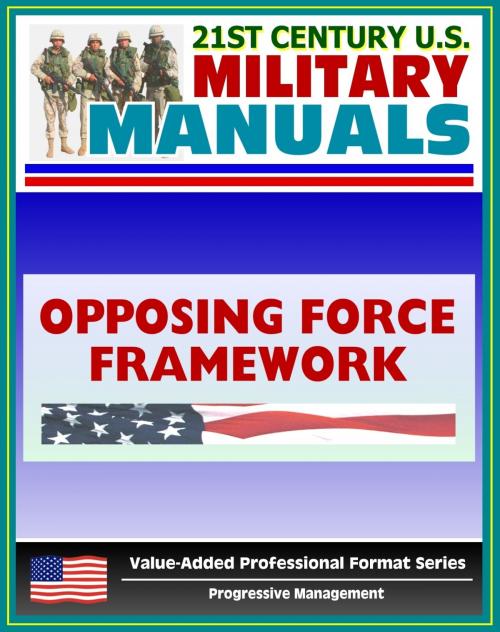21st Century U.S. Military Manuals: Opposing Force Doctrinal Framework and Strategy Field Manual - FM 7-100 (Value-Added Professional Format Series)
Nonfiction, History, Military, Social & Cultural Studies, Political Science| Author: | Progressive Management | ISBN: | 9781466101784 |
| Publisher: | Progressive Management | Publication: | September 16, 2011 |
| Imprint: | Smashwords Edition | Language: | English |
| Author: | Progressive Management |
| ISBN: | 9781466101784 |
| Publisher: | Progressive Management |
| Publication: | September 16, 2011 |
| Imprint: | Smashwords Edition |
| Language: | English |
Part of our value-added professional format series, the Opposing Force Doctrinal Framework and Strategy Field Manual (FM 7-100) presents the flexible baseline created by the TRADOC Office of the Deputy Chief of Staff for Intelligence (ODCSINT) for an OPFOR that can be adapted to meet a variety of different training requirements in a number of different scenarios that reflect the COE. The OPFOR doctrinal framework and strategy outlined in FM 7-100 represent a realistic composite of potential adversaries the Army might encounter in the real-world situations of the foreseeable future. However, the world is continually changing, as are the threats and challenges for which the Army must be prepared. The Army must remain flexible, as must the OPFOR designed to serve as a challenging sparring partner in the training environment.
This manual is approved for use in all Army training venues. However, as the contemporary OPFOR and other aspects of the COE are integrated into Army training, the TRADOC ODCSINT and the intelligence community will continue research and analysis of real-world developments and trends. The goal of this continued effort is to keep our OPFOR and our understanding of the COE truly contemporary and relevant as the world around us changes.
In today's complicated and uncertain world, it is impossible to predict the exact nature of future conflict that might involve the U.S. Army. So the Army must be ready to meet the challenges of any type of conflict, in all kinds of places, and against all kinds of threats. This is the nature of the contemporary operational environment (COE), and training for such an environment requires a different type of Opposing Force (OPFOR) than that of the past.
The Deputy Chief of Staff for Intelligence (DCSINT) of the U.S. Army Training and Doctrine Command (TRADOC) is the Executive Agent for the development, management, administration, integration, and approval functions of the OPFOR Program across the Army. Thus, the TRADOC DCSINT is responsible for documenting the doctrine, organization, and capabilities of a contemporary OPFOR that is appropriate for training the Army's leaders, soldiers, and units for the COE.
This field manual has been converted for accurate flowing-text e-book format reproduction.
As a bonus, this reproduction includes FM-1, The Army Field Manual, a capstone manual containing the vision for the Army - sold separately for $5.99. FM 1 establishes the fundamental principles for employing Landpower. The most important of these are the Army's operational concept and the fundamentals that support it. They form the foundation for all Army doctrine. All Soldiers should understand and internalize them. FM 1 describes the American profession of arms, the Army's place in it, and what it means to be a professional Soldier.
This is a privately authored news service and educational publication of Progressive Management.
Part of our value-added professional format series, the Opposing Force Doctrinal Framework and Strategy Field Manual (FM 7-100) presents the flexible baseline created by the TRADOC Office of the Deputy Chief of Staff for Intelligence (ODCSINT) for an OPFOR that can be adapted to meet a variety of different training requirements in a number of different scenarios that reflect the COE. The OPFOR doctrinal framework and strategy outlined in FM 7-100 represent a realistic composite of potential adversaries the Army might encounter in the real-world situations of the foreseeable future. However, the world is continually changing, as are the threats and challenges for which the Army must be prepared. The Army must remain flexible, as must the OPFOR designed to serve as a challenging sparring partner in the training environment.
This manual is approved for use in all Army training venues. However, as the contemporary OPFOR and other aspects of the COE are integrated into Army training, the TRADOC ODCSINT and the intelligence community will continue research and analysis of real-world developments and trends. The goal of this continued effort is to keep our OPFOR and our understanding of the COE truly contemporary and relevant as the world around us changes.
In today's complicated and uncertain world, it is impossible to predict the exact nature of future conflict that might involve the U.S. Army. So the Army must be ready to meet the challenges of any type of conflict, in all kinds of places, and against all kinds of threats. This is the nature of the contemporary operational environment (COE), and training for such an environment requires a different type of Opposing Force (OPFOR) than that of the past.
The Deputy Chief of Staff for Intelligence (DCSINT) of the U.S. Army Training and Doctrine Command (TRADOC) is the Executive Agent for the development, management, administration, integration, and approval functions of the OPFOR Program across the Army. Thus, the TRADOC DCSINT is responsible for documenting the doctrine, organization, and capabilities of a contemporary OPFOR that is appropriate for training the Army's leaders, soldiers, and units for the COE.
This field manual has been converted for accurate flowing-text e-book format reproduction.
As a bonus, this reproduction includes FM-1, The Army Field Manual, a capstone manual containing the vision for the Army - sold separately for $5.99. FM 1 establishes the fundamental principles for employing Landpower. The most important of these are the Army's operational concept and the fundamentals that support it. They form the foundation for all Army doctrine. All Soldiers should understand and internalize them. FM 1 describes the American profession of arms, the Army's place in it, and what it means to be a professional Soldier.
This is a privately authored news service and educational publication of Progressive Management.















